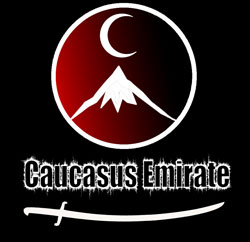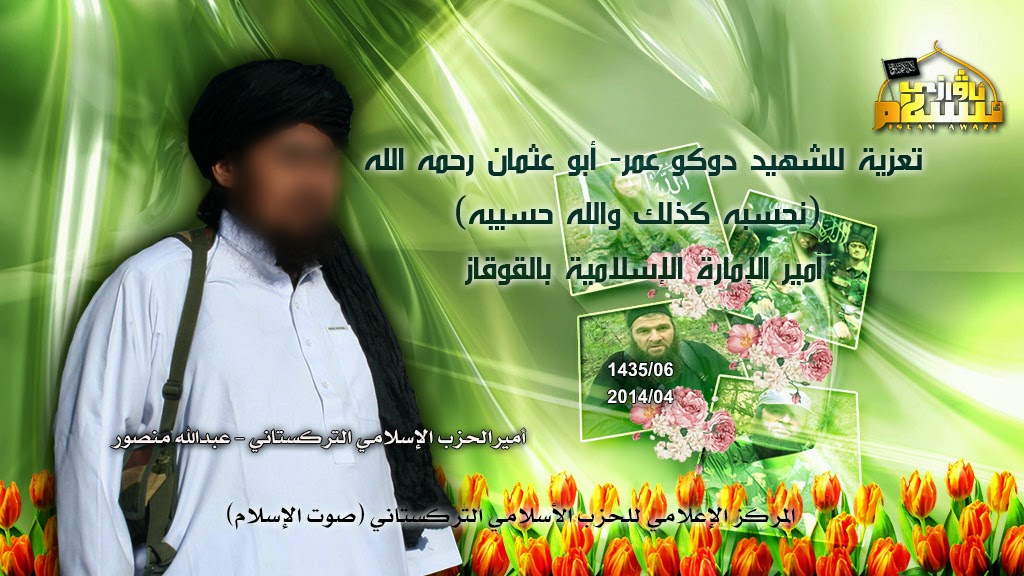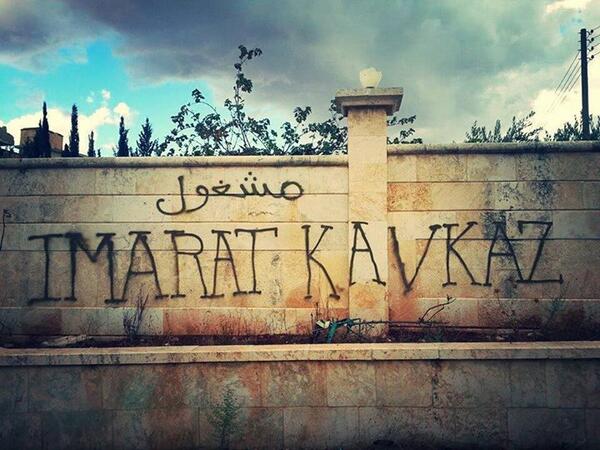
Click the following link for a safe PDF copy: Wilāyah Dagestān of Imārat al-Qawqāz — “Regarding the Heroic Retaliatory Attack Against Charlie Hebdo”
_________________
To inquire about a translation for this statement for a fee email: [email protected]
Category: The Caucasus Emirate
New statement from Wilāyah Dagestān of Imārat al-Qawqāz: "Seven Years Since the Announcement Of Imārat al-Qawqāz"

Click the following link for a safe PDF copy: Wilāyah Dagestān of Imārat al-Qawqāz — “Seven Years Since the Announcement Of Imārat al-Qawqāz”
___________
To inquire about a translation for this statement for a fee email: [email protected]
Kavkaz Center presents a new video message from Wilāyah Nokhchicho of Imārat al-Qawqāz: "Bay'ah To the Amīr Of Imārat al-Qawqāz 'Alī Abū Muḥammad al-Dagestanī"

___________
To inquire about a translation for this video message for a fee email: [email protected]
New video message from Wilāyah Dagestān of Imārat al-Qawqāz: "Eulogy For Dokku Umarov"

____________
To inquire about a translation for this video message for a fee email: [email protected]
Kavkaz Center presents a new video message from Imārat al-Qawqāz: "On the Martyrdom Of the Amīr Of Imārat al-Qawqāz Dokku Umarov"

___________
To inquire about a translation for this video message for a fee email: [email protected]
The Clear Banner: 'Let Him Eat Leaves:' North Caucasians Aligned to Islamic State Slam Caucasus Emirate Emir
NOTE: For prior parts in the Clear Banner series you can view an archive of it all here.
—
“Let Him Eat Leaves”: North Caucasians Aligned to Islamic State Slam Caucasus Emirate Emir
By Joanna Paraszczuk
A recent video address by Caucasus Emirate (CE) Emir Ali Abu Muhammad stating that North Caucasians in Syria ought to have backed Jabhat al-Nusra (JAN) and accusing the Islamic State’s (IS) military Emir in Syria Umar Shishani of worsening the fitna between IS and JAN, has unleashed a flood of responses and counter-responses from North Caucasian jihadis in various factions.
North Caucasians in or aligned with IS spoke out harshly against Abu Mohammad and the CE-affiliated group Jaish al-Muhajireen wal-Ansar (JMA), while those close to JMA expressed support for Abu Mohammad while slamming IS.
The storm has also prompted another prominent Chechen foreign fighter in Syria, Muslim Abu Walid Shishani, Emir of the independent faction Junud a-Sham, to break his long silence in a lengthy audio message discussing the “fitna in Sham,” IS, and Umar Shishani.
Previously, I examined the growing rift in Syria between North Caucasians aligned to the Caucasus Emirate, and those aligned to IS, over concepts of jihad. An exploration of some of the responses prompted by Abu Mohammad’s video message will help shed more light on this fault line. It will also show how, for North Caucasian jihadis in Syria, the question of loyalties, including with relation to the jihad “back home”, is a major cause of this rift.
1. ALI ABU MOHAMMAD’S CRITICISMS
In his video address, CE Emir Ali Abu Mohammad attempts to gain ideological and practical control not only over the CE-affilated Jaish al-Muhajireen wal-Ansar, but over all North Caucasians in Syria. He makes several main points (for an English translation, click here). These chiefly reflect his concerns over how North Caucasian participation in Syria affects the CE and the North Caucasian insurgency.
Abu Mohammad’s main points are:
1. North Caucasians wishing to fight in Syria have posed an ideological/ theological conundrum for the CE [1]. While some hadith implied Muslims could and should fight in Sham, others implied that one should fight “the closest enemy”. Abu Mohammad takes a harder line on this than his predecessor Dokku Umarov, stating that, “We did not find even one scholar calling for the brothers who are fighting in their own land, to leave the Jihad at home, and join the Jihad in Syria.”
While Abu Mohammad poses this problem as a matter of theology, in reality the issue of Caucasians in Syria is about resources, and (to some extent) prestige: the jihad in the North Caucasus needs fighters, and why should this struggle be marginalized? He admits, “We hoped that [Caucasians in Syria] would return to their home country after taking part in the jihad in Syria so we could share our experience with them, and that they would help us. This is because we have a severe shortage of brothers.”
2. The decision to form JMA went against the instructions of the CE, who told North Caucasian fighters not to form a CE battalion in Syria, but rather to join the “oldest and most legitimate” jamaat. Abu Mohammad deems this to be Jabhat al-Nusra. The CE also instructed fighters not to make video or other addresses. By disobeying, North Caucasians have made it known to “the Kuffar”—Abu Mohammad is of course referring to Russia—that the CE are fighting in Syria, making it harder for Caucasians to return home and fight there.
3. Abu Mohammad makes a personal address to two individuals: Umar Shishani, and his deputy Abu Jihad. Umar Shishani’s decision to join IS was mistaken, according to Abu Mohammad. Umar then disobeyed orders by failing to maintain a neutral stance in the fitna. Umar should not speak on behalf of the CE, should stay out of politics because he does not express himself well, and should return to JMA, Abu Mohammad insists. Regarding Abu Jihad, Abu Mohammad says the CE does not know who he is.
2. REACTIONS FROM NORTH CAUCASIANS IN AND ALIGNED TO IS
North Caucasian fighters in Syria and their factions maintain a network of social media accounts—mostly on Russian social networking site VKontakte—and Web sites. Many of these published criticisms of Abu Muhammad’s address, of the Caucasus Emirate in general, and of the Caucasus Emirate’s representatives in Turkey in particular.
Sham Today (ST), a VK account run by North Caucasian fighters in ISIS, published a multi–part response to the CE Emir’s address.
Like other IS-affiliated jihadis, ST was particularly incensed by what the writer saw as a personal attack by Abu Muhammad on Umar Shishani and Abu Jihad.
Beyond this, ST’s reactions also shed light onto how at least some IS jihadis perceive the jihad in Syria in relation to the insurgency in the North Caucasus. It is notable that IS-affiliated fighters, while setting themselves apart from the CE, still emphasize that they are North Caucasians, and even question whether JMA/CE affiliated fighters are “true” North Caucasians, and/or whether they truly can claim the North Caucasian jihadi heritage.
Rather than considering the North Caucasian struggle as separate from that in Syria, ST’s response suggests it wants to consider both conflicts as part of a wider transnational jihad. ST’s response also demonstrates that its writer does not consider himself obedient to the CE: the writer is careful to express solidarity with “brothers fighting in the Caucasus,” not “with the Caucasus Emirate.”
With regard to the CE itself, ST dismisses the group as out of touch with the situation in Syria (and by extension with the true state of global jihadi affairs):
The CE leadership have no clue what is really happening in Sham. It’s entire knowledge resource is the internet, non-objective tales from CE representatives in Turkey, and other non-objective opinion.
ST argues that the CE’s presence in Syria has always been limited to a small group; that Umar was not, as Abu Muhammad claimed, sent by the CE to Syria; and that Umar never had an oath of allegiance to the CE, though he “respected Dokku Umarov.” Rather, Umar was the Emir of a multiethnic faction, JMA, within which the CE-affiliated fighters were a small, discrete group with their own Emir. Writing of Umar’s decision to pledge allegiance to then-ISIS, ST emphasizes that Umar’s jamaat did not only include North Caucasians:
That night, Emir Umar and the first group gave bayat to ISIS and it was clear that the whole Muhajireen wal-Ansar brigade and its Emirs would go to ISIS, these were Caucasians, Arabs, Turks, Azerbaijanis, Europeans, Uzbeks, Tajiks, and others. The only ones who didn’t go was the CE group.
ST further claims that the CE had tried to press its own, local goals among North Caucasians in Syria, thus hindering the jihad, by sending representatives from Istanbul to interfere with Umar. Rather than supporting these jihadis in fighting the Kuffar on the global stage, the CE pushed its narrow, national interests, browbeating Umar into agreeing to train and send CE Mujahideen back to the Caucasus:
Representatives of the CE came to Syria from Turkey, ranted at Umar as per usual and told him how it was hard for them and what the situation in the Caucasus was, that he had to help the Caucasus and send brothers home, prepare them, unite them, and whatnot. After multiple negotiations, Umar knew he would have a ton of problems with them and that it would really distract him as he actively waged jihad in Sham… so he agreed. After all, he himself is from the Caucasus, he is pained and suffers because of the position of the Mujahideen in the Caucasus, as do we all, he really loved and respected Dokku Abu Usman…
Despite this, the CE refused to support its faction in Syria, leaving their welfare to Umar:
All the CE in Syria jamaat’s expenses were paid for by Umar’s jamaat. Food, weapons, cars, visits to Turkey and Europe, sending cash to the Caucasus, treating brothers…they didn’t have a single ruble to spend, it all came from Umar…
In warning the CE that it is alienating the wider ummah by criticizing IS and Umar, ST positions itself as part of that ummah within the wider jihad. Rather than seeing Abu Muhammad as the Emir of all North Caucasian jihadis, ST implies he is but a small, Russian-speaking fish in a very big jihadi pond:
We advise you to change your informants…whoever shows friendship to infidels and does not show hatred toward them..is in a bad position. This video is already translated into Arabic and the entire Ummah and most mujahideen are watching this video on the lands of jihad… in Syria, in Iraq, in Yemen, Somalia, Afghanistan, Pakistan, and elsewhere. The reaction is negative and many are asking us, “how can the Mujahideen of the Caucasus and their Emir talk that way and insult us and our Emirs…Maybe we only knew their good side…”
3. JAISH AL-MUHAJIREEN WAL ANSAR: UMAR BROKE HIS OATH
In response to these criticisms, CE fighters published a rebuttal on the pro-CE VK account Ajr ot Allakha Subhanu wa Tag’alya SHAM, stressing their loyalty to the CE and Abu Muhammad:
[A]fter our Emir, Ali Abu Muhammad clarified his position regarding the fitna in Syria, some began to unleash on our Emir a barrage of criticism with with explanations about the fitna in Syria, totally humiliating the dignity of the Mujahideen of the Caucasus Emirate in the blessed land of Sham.
Arguing that both Umar and Abu Jihad had in fact pledged allegiance to Dokku Umarov, the rebuttal concludes that both men have broken that oath by swearing to ISIS. Umar and his followers, they argue, should not have broken their first oath to Umarov, because the conditions had not arisen to allow them to do so. CE jihadis, even those fighting in Syria, cannot relinquish their allegiance to the CE until there is a single Emir to whom all Muslims
Kavkaz Center presents a new video message from Imārat al-Qawqāz's 'Alī Abū Muḥammad: "Imārat al-Qawqāz's Position In Connection With the Fitnah in al-Shām"
UPDATE 6/25/14 10:16 AM: Here is an English translation of the below video message:
Click the following link for a safe PDF copy: ‘Alī Abū Muḥammad — “Imārat al-Qawqāz’s Position In Connection With the Fitnah in al-Shām” (En)
__________
—

__________
New video message from Wilāyah Dagestān of Imārat al-Qawqāz: "Eulogy For the Comprehensive Martyrs Of the Fortress"

___________
To inquire about a translation for this video message for a fee email: [email protected]
Ṣawt al-Islām presents a new video message from Ḥizb al-Islāmī al-Turkistānī's [Turkistan Islamic Party] 'Abd Allah Manṣūr: "Eulogy For the Amīr Abū ‘Uthmān Dokku Umarov"

_________
To inquire about a translation for this video message for a fee email: [email protected]
The Clear Banner: "The Clash Over 'Real Jihad' in Syria: ISIS vs. the Caucasus Emirate"
NOTE: For prior parts in the Clear Banner series you can view an archive of it all here.
—
The Clash Over ‘Real Jihad’ in Syria: ISIS vs. the Caucasus Emirate

By Joanna Paraszczuk
The ongoing hostilities between the Islamic State of Iraq and a-Sham (ISIS) and Syrian brigades have exacerbated a pre-existing rift between rival North Caucasian factions in Syria, specifically Umar Shishani’s faction in ISIS and his former brigade Jaish al-Muhajireen wal-Ansar, which considers itself aligned to the Caucasus Emirate.
Essentially a struggle for prestige among North Caucasian jihadis in Syria and their supporters, the North Caucasian infighting has grown out of an ideological battle over which faction has the “correct” approach to jihad in general and the jihad “back home” in the North Caucasus in particular; how the jihad in Syria relates to the Caucasus Emirate’s struggle in the North Caucasus; and the circumstances under which North Caucasians may wage jihad in Syria instead of at home.
The ongoing debate has raised key questions not only about where North Caucasian jihadis’ loyalties should lie, but also about the nature of jihad in the North Caucasus and its relationship to jihad in other parts of the world. Is the North Caucasian struggle primarily a local, ethno-national battle restricted to “lands ruled by the Russian kuffar” (in which case North Caucasians ought to stay at home and fight there)? Or is it just one small part of a wider, transnational movement focussed on establishing a global Caliphate, a struggle that knows no national boundaries?
These difficult questions have been addressed by North Caucasians in Syria, by the Caucasus Emirate leadership itself and by pro-Caucasus Emirate outlets like Kavkaz Center. Moreover, against the background of the ongoing hostilities between the Islamic State of Iraq and as-Sham and Syrian brigades, this debate has become an integral element of a growing ideological rift between North Caucasians loyal to ISIS and those loyal to the Caucasus Emirate.
ORIGINS OF CHECHEN FIGHTERS IN SYRIA
The exact number of Chechen jihadis in Syria is unknown (and in any case numbers are fluid, as fighters are killed and new recruits enter Syria). Estimates have varied from around 200 to as many 1,700 fighters (the latter figure was given by the Russian Embassy in Damascus and is likely exaggerated).
Regardless of their numbers, these Chechen jihadis can be divided into four groups. The largest group are ethnic Chechens who had been living in Europe as migrants or refugees. The second-largest group is ethnic Chechens from Georgia’s Pankisi Gorge. Russian-language news site Kavkazskii Uzel estimates there are around 200 Pankisi Chechens in Syria, the most prominent of whom is ISIS military emir Umar Shishani. The third group are Chechens who came from Chechnya itself. Estimates of this group vary from 30-100 fighters and these include fighters from “Tarkhan’s jamaat”, the faction of Chechen commander Tarkhan Ismailovich Gaziyev, who split from Dokku Umarov in 2010. The smallest group consists of veterans of the Russo-Chechen wars, the most well-known of whom is Muslim Abu Walid Shishani who fought with Emir Khattab in Chechnya from 1995. Abu Musa Shishani, of whom little is known, is a seasoned fighter and is also likely a Chechen war veteran.
THE CAUCASUS EMIRATE’S POSITION ON THE SYRIAN JIHAD
The Caucasus Emirate (CE), officially declared on 31 October 2007 by a group of North Caucasian jihadis led by Dokku Umarov, has been described as a “transnational entity that extends beyond the Caucasus to encompass all Muslims oppressed by ‘Rusnya’” [i.e. Russia]. Umarov (whose death was announced on 18 March) expressed opposition to North Caucasian fighters traveling to Syria to wage jihad. In a November 2012 video address, Umarov accused those who had gone to Syria of undermining jihad at home, warning that these fighters were not waging jihad but simply trying to replace one taghut for another:
There are people going there [to Syria] who are saying that there is no jihad in the Caucasus, that jihad in the Caucasus is over, and therefore they allegedly went to Syria. No, there is jihad in the Caucasus, and it is more brutal and more severe than in Syria. No one provides help or support for jihad in the Caucasus.
However, by summer 2013, just before the first splits began to appear in the Chechen ranks, it seemed the CE was – at least in part – reevaluating this view, with CE-linked publications like Kavkaz Center beginning to report positively on Chechen fighters in Syria. As one analyst has argued, this move was likely, at least in part, an attempt to assert authority over Chechen jihadis in Syria, who appeared to be gaining in power and prestige.
While the Caucasus Emirate hardly expressed its full support for North Caucasians going to Syria to wage jihad, via its media outlets it moved toward the admission that this was permissible, if only for those who were not in a position to wage jihad back home. In other words, jihad in the North Caucasus should take priority over that in Syria, but the North Caucasian and Syrian jihads were part of the same global struggle of Islam against the kuffar.
Kavkaz Center hinted at this new position in July 2013 through a “letter to the editor” (purportedly) written by one Umm Sayfullah of Uruz Marten:
“The issue I want to discuss is jihad in Syria and the Caucasus. And even though several articles and fatwas have been published on this matter, the situation has not been clarified.
Jihad in Syria started after the jihad in the Caucasus, in Afghanistan, Iraq, Palestine, where the Holy Al-Quds has for several decades been occupied by the kuffar, but it’s the jihad in Syria that has become most popular among Russian-speaking followers of Islam, and even Caucasian Muslims, who are going to Syria in entire jamaats.
In connection with this, I want to raise the question — is it not a priority for Caucasian Muslims to wage jihad in the Caucasus? Allah is my witness, I’m not against brothers going to Sham. But isn’t fighting the kuffar in the Caucasus more important for Muslims from this area?
In Syria, as we know, Muslims are coming from all Arab countries, and also from Turkey, Pakistan, Southeast Asia, Europe, and America… So what about the Caucasus? It is right for Muslims to leave the fight at home and go to another area?
I understand that the jihad in Syria needs Mujahideen. We see how the kuffar, Shi’ites from all over the globe are joining in the war against Sham and this is a serious issue. But for Caucasians, in my view, the priority has to be jihad in their native home. After all, the hardest jihad is in the Caucasus today! …
I think that Emirs in the Caucasus and in Syria need to explain to people, that those Caucasian brothers who can join the jihad in the Caucasus must in the first instance try to go there. And in the event that there is no way for them to get there or if there is some major reason — then they can go elsewhere.
Those brothers from Syria, who ask for help, must absolutely explain that they are talking about those who cannot wage jihad for the Caucasus Emirate. And that for Caucasians, jihad at home is more important and the first priority over jihad in any other place.”
Two weeks later, on July 30, 2013, this message was further reinforced in a a video address — also published on Kavkaz Center — by a Chechen fighter named Salahuddin Shishani, at the time the commander of a group named az-Zubеyr. Salahuddin, who had been named the “official representative of the Caucasus Emirate in Syria” was therefore presumably also speaking in that faction’s name when he addressed “the Muslims of the Caucasus, Crimea, and other Muslim lands occupied by the Russian kuffar”. In other words, this is not an address intended for Muslims or Mujahideen in general, but for those under the ideological sway of the Caucasus Emirate.
In the video, Salahuddin – whose affiliation to the Caucasus Emirate further emphasized by his sartorial choice of an “Imarat Kavkaz” logoed t-shirt – repeats the message given in Umm Sayfulla’s letter, but goes beyond this by placing the issue of where North Caucasians should wage jihad in the context of a more global cause. It is understandable, he notes, that Muslims from countries where there is no jihad or where it is not possible to wage jihad should come to Syria. However, he cautions, such a move is “not correct” for those in places where there is already jihad, such as Libya, Kashmir “or our Caucasus”. Notably, Salahuddin also refers clearly to Dokku Umarov’s authority by noting that the CE leader gave an explicit order for North Caucasians to wage jihad against the Sochi Olympics, an order which must take priority to the jihad in Syria, at least for those able to fulfill it.
SPLITS IN THE RANKS
Infighting among North Caucasian fighters in Syria began as early as August 2013. By summer 2013, many if not most Chechen fighters were part of the Jaish al-Muhajireen wal-Ansar brigade (JMA), commanded by a charismatic, ginger-bearded jihadi named Umar Shishani.
By August, however, there were already signs of tensions among North Caucasian jihadis.
One cause of the tensions was the decision by Umar Shishani to take on the role of ISIS military emir in northern Syria. Although at that stage he had not formally sworn allegiance to ISIS nor did he move for JMA to be absorbed into join ISIS, the predominantly North Caucasian faction was de facto fighting as part of ISIS, most notably in the battle for Menagh Airbase in Aleppo.
In August, Umar very publicly expelled a group of about 27 Chechens headed by Sayfullah Shishani, a charismatic and volatile ethnic Chechen who was formerly Umar’s
